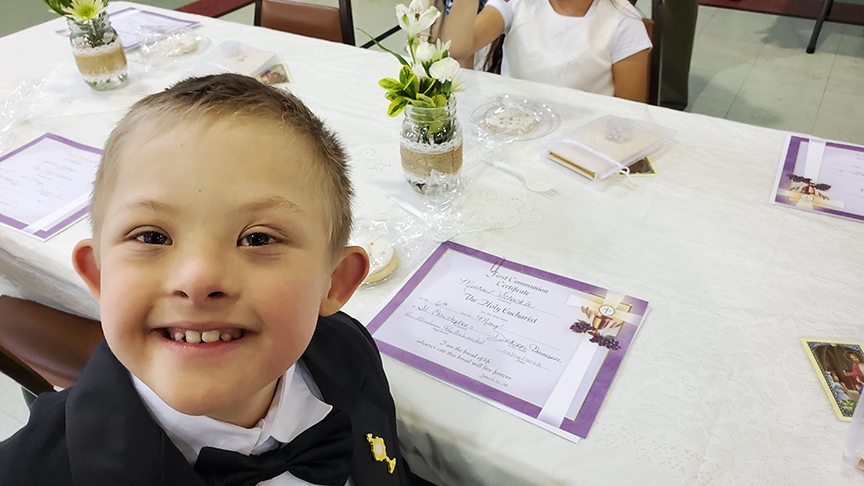
Earlier this month, Michael “Mikey” Schachle, the boy whose cure from a deadly condition while still in his mother’s womb was declared a miracle that led to the beatification of Knights of Columbus founder Father Michael McGivney, received his First Communion at St. Christopher Church in Dickson.
It was no doubt a wonderful day for Mikey, his parents Dan and Michelle Schachle, and his 12 brothers and sisters.
Miracles by definition are rare events. One can only wonder what it has been like for Mikey and his family to have a miracle touch their lives so deeply, to witness in the most personal way how God is active in the world.
It’s that close connection to the divine that gives miracles such a powerful impact. As Jesus performed numerous miracles during his public ministry, which began with the miracle of turning water into wine at the wedding at Cana, it drew to him people who were wondering if He was the messiah, and if He was, what would that mean for them.
In her book “Signs and Wonders: A Beginner’s Guide to the Miracles of Jesus,” world-renowned New Testament scholar Dr. Amy-Jill Levine noted that as Jesus’ reputation as a miracle worker grew, the family and friends of the blind and the lame and the dying would bring their loved ones to Jesus and ask Him to save them. They advocated for those who needed a cure.
It’s not difficult to see Dan and Michelle Schachle in the role of advocate for their son, praying, with Father McGivney’s intercession, that God would save him. But like the advocates in the Scriptures, they didn’t pray for a miracle to test God, seeking proof that God loved them. Like the advocates of the Scriptures, they know God loves them, and it was their faith in God’s love and mercy that moved them to act. It was their belief that with God all things are possible that gave them the courage to ask for a miracle.
In 2020, after Mikey’s cure was proclaimed a miracle by the Church, Dan Schachle told the Tennessee Register, “I think God had a plan for Father McGivney. I think God had a plan for Michael. You have to be open to God’s grace, you have to be open to God’s plan, because if you’re not open to God’s plan, he can’t use you.”
In the Scriptures, the accounts of the miracles aren’t simply acts of a wonder worker. The miracle is always about more than just the person helped. The miracles come with a theological lesson. When Jesus restores sight to the blind, it is so we can see the love and mercy of God. When He heals the lame it is so we can proclaim that faith in God can restore our lives. When He calms the seas, it is so we can know to trust in God when life tosses us to and fro. When He raises the dead, it is so we can see a glimpse of His own resurrection and victory over death.
And in miracles, we find hope. They assure us that God is accompanying us on our journey to heaven, that He will help us to our feet when we stumble, that He will give us strength when we are weary, that in Him we can find comfort when we feel alone or frightened.
In her book “Signs and Wonders,” Dr. Levine asks: If we believe in the miracles described in Scripture, if we believe in modern miracles like Michael Schachle’s cure, what then? How do those miracles shape our lives? What action does it prompt in us?
We must share with others in the way we live our lives the love and mercy of God that are revealed in miracles. Our faith in God must drive us to love our neighbor as ourselves. We must care for the sick, as Christ did. We must feed the hungry, as Christ did. We must comfort the marginalized as Christ did. We must welcome the stranger, as Christ did. Our faith must open the eyes of the blind. Our trust in God must sustain those buffeted by storms. Our faith must be a wellspring of strength.
In that way, maybe we can be one of God’s miracles.









